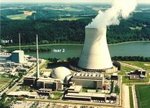 Tomorrow the IAEA is expected to refer Iran to the UN Security Council for potential sanctions or other actions in response to Tehran's defiance of IAEA demands that Iran halt uranium enrichment and allow inspection of its nuclear facilities. The IAEA Board voted on the referral a month ago, but allowed a month's grace time for continued negotiations and an assessment by IAEA Chief Mohammed El Baradei.
Tomorrow the IAEA is expected to refer Iran to the UN Security Council for potential sanctions or other actions in response to Tehran's defiance of IAEA demands that Iran halt uranium enrichment and allow inspection of its nuclear facilities. The IAEA Board voted on the referral a month ago, but allowed a month's grace time for continued negotiations and an assessment by IAEA Chief Mohammed El Baradei.
Meanwhile the Iranian government is insisting that a Security Council referral will only intensify its determination to go nuclear. Thus far, while the IAEA has concluded that Iran is taking steps to expand its enrichment program, the agency has not had adequate access or cooperation to determine whether the efforts are entirely peaceful in purpose. The New York Times reports:
"If Iran's nuclear dossier is referred to the U.N. Security Council, uranium enrichment will be resumed," Iran's top nuclear negotiator, Ali Larijani, said at a news conference, referring to large-scale enrichment. "Nuclear research and development are part of Iran's national interests and sovereignty and we will not give them up."
Larijani goes on to raise the specter of a cut in oil output if the international community continues to apply pressure.
An Iranian nuclear weapon seems to be years away. Yet Iranian President Mahmoud Ahmadinejad's open defiance poses a fundamental problem. In light of the drubbing the UN's gotten in recent years for its inability to face down rogue states, the organization must be unified in refusing to back down in the face of Tehran's threats. The UN cannot do nothing and let Tehran's goading stand.
But despite the intensive focus on the Iranian threat in recent months, every realistic policy option has major drawbacks. The problems I outlined here remain unsolved. Diplomatic sanctions may cut down even further visibility on Iran's nuclear activities. Economic sanctions will be difficult to target at the government. A ban on Iranian oil is predicted to send prices spiking, potentially hurting the world more than it does Iran.
A couple of observations:
- Like the nuclear accord with India last week, this situation pits bedrock principles of international relations (in this case the need for the international community to unite and forcefully face down rogues) against the hard place of a dangerous immediate dilemma (the risk of inflaming an already unstable leader in oil-rich Iran).
- The dilemma also illustrates a rising feature of the geopolitical landscape that I discuss in this article entitled Democracy Confronts the Superpower, namely that public opinion and the pluralization of international relations is playing a growing role in constraining the US's policy options. There is grave concern that the imposition of sanctions on Iran will fan already stoked nationalism that is tightening Ahmadinejad's hold on power. So the UNSC debate will take into account not just how to influence Tehran, but what to signal the Iranian people. After Iraq, and particularly because the Administration learned the hard way that a small cabal of exiles could not speak for the Iraqi people, this consideration is uppermost.
- The upshot is that the Administration and the UN should start small, recognizing that unity of purpose is key in what are still the early days of this debate. Diplomatic sanctions, asset freezes and the like won't put a tight squeeze on Iran, but they will allow the UNSC membership to reach consensus and lay a foundation for future joint action if Iranian defiance persists.




